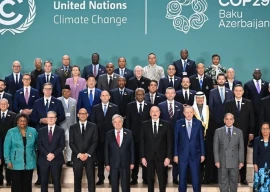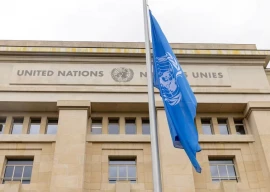
Suspicions grew that the veteran leader, in power for four decades, does not understand the strength of the forces now massed against him.
"All my people love me. They would die to protect me," he told the US ABC network and the BBC on Monday, dismissing the armed muscle of a rebellion against his 41-year rule that has ended his control over eastern Libya.
Barely 12 hours after the United States said it was moving warships and air forces closer to the north African oil exporting country, Libyan forces re-asserted their presence at the remote Dehiba southern border crossing on Tuesday, decorating the border post with green Libyan flags.
Reporters on the Tunisian side saw Libyan army vehicles, and soldiers armed with Kalashnikov rifles. The previous day, there was no Libyan security presence at the border crossing. Dehiba is about 60 km (40 miles) from the town of Nalut.
In another part of the west, residents said pro-Qaddafi forces deployed to reassert control of Nalut, about 60 km from the Tunisian border in western Libya, to ensure it did not fall into the hands of anti-Qaddafi protesters.
The United States said on Monday it was moving ships and planes closer to the country and British Prime Minister David Cameron said his government would work to prepare a "no-fly" zone to protect the Libyan people.
The United States, whose Sixth Fleet operates out of Italy, said it was working on contingency plans, including humanitarian assistance. Analysts said military action against Qaddafi was unlikely.
Injecting a note of caution into Western military thinking, France said humanitarian aid must be the priority in Libya rather than military action to oust Qaddafi.
The French government has sent two airplanes with medical equipment and staff to the Libyan city of Benghazi, now in the hands of anti-Qaddafi rebels, and more planes are to follow, government spokesman Francois Baroin said.
Asked about the possibility of military action to dislodge Qaddafi, Baroin told France 2 television: "It's not a priority. The priority is humanitarian aid, it's no longer diplomacy."
Qaddafi scoffs at revolt
Despite his continued hold on Tripoli, his last remaining stronghold, Qaddafi's power to influence events in his vast desert country has shrunk dramatically in the past two weeks.
Numerous tribal leaders, officials, military officers and army units have defected to the rebels, taking with them large swathes of the country including the main energy-producing east. Sanctions will squeeze his access to funds.
But in his interview, Qaddafi, 68, looked relaxed and laughed at times during the interview at a restaurant on Tripoli's Mediterranean coast and scoffed at the uprising.
He denied using his air force to attack protesters but said planes had bombed military sites and ammunition depots. He also denied there had been demonstrations and said young people were given drugs by al Qaeda and therefore took to the streets. Libyan forces had orders not to fire back at them, he said.
US ambassador to the United Nations Susan Rice called him "delusional."
She said Washington was in talks with its NATO partners and other allies about military options. The United States also said about $30 billion in assets in the United States had been blocked from access by Qaddafi and his family.
White House spokesman Jay Carney said on Monday that going into exile would be one option for Qaddafi in meeting international demands that he leave power.
There was mixed reaction from analysts to the news of Western military preparations.
Algerian exile Abdullah Anas, an influential voice among north African Islamists, said Western military help for Libya's revolutionaries would be a mistake.
He said any Western armed help would be exploited by al Qaeda as a sign of Western imperialism, as was the West's 2003 invasion of Iraq.
"It will be another call for jihad. It will benefit both Qaddafi and al Qaeda," he said in an interview before the announcements. "The West should remember what happened in Iraq."
"Call for jihad"
Alia Brahimi, a north African specialist at the London School of Economics, said some sort of multilateral protection force should be on the table to protect civilians.
"It would unnecessarily complicate things to have Western forces in the mix unless that's to prevent some sort of genocide," she added.
As the uprising entered its third week, the situation on the ground was often hard for reporters to assess due to the difficulties of moving around some parts of the desert nation and the patchy communications.
On Monday, witnesses in Misrata, a city of half a million people 200 km (125 miles) to the east of Tripoli, and Zawiyah, a strategic refinery town 50 km (30 miles) to the west, said government forces were mounting or preparing attacks.
The UN Security Council on Saturday imposed sanctions on Qaddafi and other Libyan officials, imposed an arms embargo and froze Libyan assets. European Union governments approved their sanctions against Qaddafi in Brussels on Monday.

1722586547-0/Untitled-design-(73)1722586547-0-165x106.webp)


1732326457-0/prime-(1)1732326457-0-165x106.webp)


1731325890-0/trump-(24)1731325890-0-270x192.webp)









COMMENTS
Comments are moderated and generally will be posted if they are on-topic and not abusive.
For more information, please see our Comments FAQ